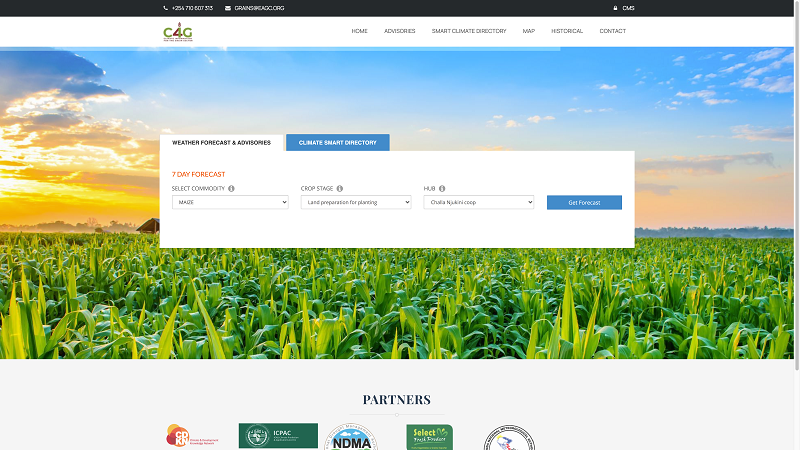New tool launched to help East African grain farmers to manage climate risks
New tool launched to help East African grain farmers to manage climate risks
Guy Rudolph of CDKN describes a new Climate Information for Grains tool, which is designed to help farmers respond to climate change.
As we witness more and more extreme climate events across East Africa, building a climate resilient food supply becomes increasingly important. The Eastern Africa Grain Council, in partnership with CDKN, has been working to address this challenge.
Last month, the partners launched the Climate Information for Grains (Ci4G) tool: an online platform that is designed to help farmers and others in the grain sector to plan short-term activities and build resilience to variable weather in the medium term.
The Ci4G tool provides weather forecasts and makes actionable recommendations based on the forecasts. These include, for example: when to start planting, harvesting, or performing post-harvest activities, such as drying. Recommendations are tailored to each farmer based on their location, the grain that they are growing, and the stage of the cropping cycle.
“Forewarned is forearmed” said Gerald Masilia, Eastern Africa Grain Council’s (EAGC) Director, on launching the tool at a 28 October virtual event.
This tool was not designed in isolation; rather, the very idea for the tool - and its format and content - arose from an assessment of farmers’ needs by EAGC in Kenya and Uganda.
Rolling out the Ci4G to farmers
Developing the tool is just the first stage. Extension officers working through EAGC’s Grain Hubs – farmer groups in the EAGC network – will lead its roll-out and will train people how to use the tool and apply the information. The Grain Hubs already facilitate trade-related activities and are well positioned to disseminate the tool.
One of the most obvious challenges faced by the team is the lack of internet access in Kenya and Uganda, especially among small-scale farmers, whom the Ci4G is designed to help. To address this, the EAGC developed an SMS-based system alongside the online platform. This will share recommendations with the Grain Hubs, based on the weekly weather forecast for their location, which will enable their members to make timely decisions, based on their situation.
EAGC is working to support the farmers further by linking the advisories to suggestions of climate-smart technology suppliers, where relevant. This feature should improve the likelihood of farmers’ taking up the recommendations. It will guide farmers toward improving their longer-term resilience to variable weather and climate, by using technologies such as drought-resilient seeds, or hermetic storage bags to better preserve their grains after harvesting.
Early responses to the Ci4G tool
The tool was well received during the 28 October launch event. Barbara Mbabazi, from Agra Rwanda, said that the tool is “coming at the right time when we are experiencing a number of agricultural challenges, so that we can make informed decisions about seeds to plant, what technologies to adopt”.
Kenneth Kemucie of the IGAD Climate Prediction and Applications Centre (ICPAC) noted that the tool is fulfilling an important function, by converting raw meteorological data provided by ICPAC into tailored weather forecasts and advisories. John Mwangi, drought information manager at the Kenyan National Drought Management Authority (NDMA), said he believed that uptake of the tool would, “without doubt, contribute to food security in the region, and help to end drought-related emergencies”.
The tool is being refined based on inputs from ICPAC and climate science experts from the Future Climate for Africa (FCFA) programme. This is an ongoing process, and further feedback was obtained during the launch event itself. In response to a request from Rikki Agudah from the Society for Crop Agribusiness Advisors of Kenya, EAGC is adding google maps integration into the tool so that users can select a location on the map, and see the weather forecast and advisories related to that location.
Since the event, EAGC members from other countries have requested that the tool’s scope be expanded beyond Kenya and Uganda to serve stakeholders in Malawi, Tanzania, Zambia and Rwanda. This request affirms the need for this tool across East Africa, and the partners will be seeking funding to expand the tool’s scope in the year ahead.
Image (above, right, courtesy EAGC)
The Eastern Africa Grain Council (EAGC), Executive Director, Mr. Gerald Masila (left) and the Regional Programs Coordinator Ms. Janet Ngombalu at the EAGC Regional Office, Nairobi, Kenya during the virtual launch of the Climate Information for Grains (Ci4G).

